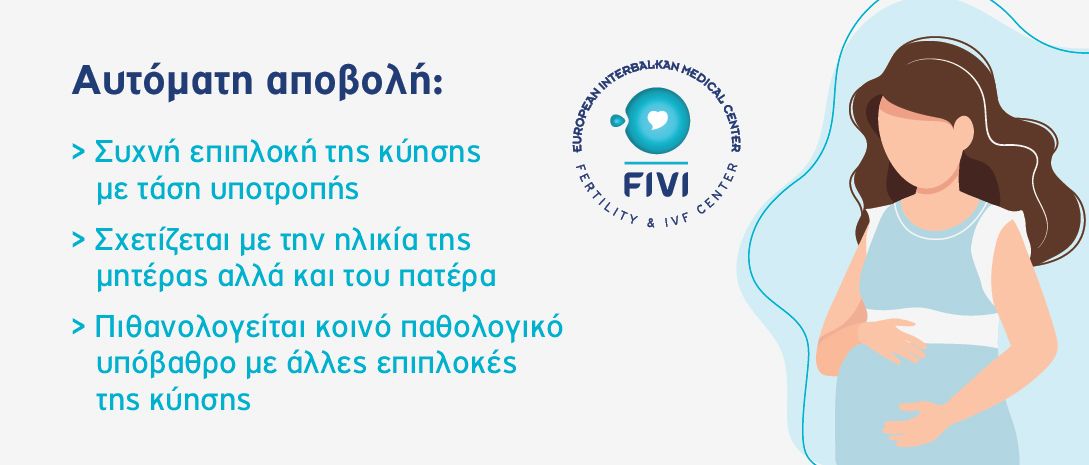Age and spontaneous abortion
Spontaneous abortion or miscarriage, usually during the first trimester of pregnancy (until the 13th pregnancy week), is a common complication and refers to a‘spontaneous (without intervention) abortion of the pregnancy before the stage of viability (24th week)’. There are different types such as complete, incomplete, threatened, missed, septic etc.
The causes are multifacrorial and mostly unknown (>50%). Most probably the result of a combined effect between parental age, genetic, immunological, hormonal and environmental factors. The frequency appears varying and contradicting in the various studies reported, mostly due to the heterogeneity of the methods used and the recording of the results. Overall, 10-15% of clinically diagnosed pregnancies in women of reproductive age (15-45 years), results in spontaneous abortion (miscarriage). However, there are many more missed ones before they are clinically diagnosed, especially when they occur early, before the 7th week and transvaginal ultrasound examination is not performed. It is estimated that, finally, only 30% of the total conceptions result in the birth of a live baby.
The above results vary also between different groups of women with a steady increase parallel to the age. For instance, while at the age before 30 the rate does not exceed the 10% of the total number of pregnancies, at the age of 45 and after, the rate is 50% and above!. Women with a previous history of miscarriage have a tendency for recurrence. After two miscarriages the risk of recurrence is double and after three, increases four times!. According to more recent studies, the risk, interestingly, increases significantly also in women who experienced other types of complications in previous pregnancy like premature labor, Cesarean Section, gestational diabetes, low birth weight of the woman herself etc.
Considering the above association between miscarriages and various obstetric complications in previous pregnancy/ies, it has been postulated that a common pathological back-round probably exists which justifies and already is, under further investigation.
In view of these new observations that are emerging recently, women with such a past history, deserve additional follow-up and management.
Another prognostic index of increased risk, regardless of age, is considered to be‘the poor ovarian reserve’ based on the ΑΜΗ levels (Anti-Myllerian Hormone levels). Furthermore, recent retrospective studies have reported that obesity also, increases the risk of both sporadic and recurrent miscarriages. In approximately 2–5% of couples with recurrent miscarriages, one of the partners carries a balanced structural chromosomal anomaly: most commonly a balanced reciprocal or Robertsonian translocation.
The risk of spontaneous abortion (spontaneous abortion) in relation to paternal age.
During the last decades a steady increase of the age of marriage and reproduction in both, women and men, is observed. Due to increasing decline of the reproductive capability parallel to the advancing age, especially after 35, many of them resort into various, time consuming and costly methods in order to achieve the ‘desired pregnancy’. The couples, ought to be informed about the additional risks associated with the motherhood as well as with the fatherhood in advanced age (beyond 35). It is statistically proved that the age of the father after 50 represents an independent factor of increased risk for miscarriage. A predisposition often ignored.
In addition, based on recent studies, it has been supported that advanced reproductive age of the man (>40) may be associated with increased risk of obstetric complications and certain health problems of the neonate e.g. small increase of rare anatomical malformations (skull, limbs and heart), autism, mental disorders (premature appearance of symptoms of schizophrenia later on), acute lymphoblastic leukemia etc., probably due to mutations that occur in men of older age. However, this field of research remains limited and contradictory. The risk of these debatable complications is considered small and doubtful, especially in comparison to the advanced reproductive age of the mother, requiring further investigation. Seeking genetic advice though when the age of the man attempting a pregnancy is 40 years of age and beyond, is not meaningless.
Spontaneous abortion, that is unintended loss of early pregnancy before 24 weeks, generally is accompanied by heavy emotional burden, even more so if it re-occurs or when it happens after a prolonged effort to achieve pregnancy due to subfertility. These couples need psychological support and genetic guidance.
Conclusion
- Spontaneous abortion of pregnancy is a common complication with a tendency to re-occur.
- It is directly related with the age of the mother as well as with the age of the father, to a lesser degree.
- There is evidence that spontaneous abortion shares common pathological back-round with other pregnancy complications.
- Psychological support and genetic counselling are indicated.
Literature
Royal College of Obstetricians and Gynaecologists. The Investigation and Treatment of Couples with Recurrent First and Second-trimester Miscarriage. Green-top Guideline No. 17, April 2011.
Macklon NS, Geraedts JPM, Fauser BCJM. Conception to ongoing pregnancy: the “black box” of early pregnancy loss. Hum Reprod Update. 2002;8:333
Chang EJ, Bendikson K, Nguyen BT. Advanced paternal age increases the risk of spontaneous abortion. Fertil Steril 2017; 108, Supplement: e104–e105
Magnus M.C., Wilcox A. J., Morken N-H., et al. Role of maternal age and pregnancy history in risk of miscarriage: prospective register based study. BMJ, 2019; 20;364
Nguyen BT, Chang EJ, BendiksonKA. Advanced Paternal Age and the Risk of Spontaneous Abortion: An Analysis of the Combined 2011-2013 and 2013-2015 National Survey of Family Growth. Am J Obstet Gynecol; 2019 221(5):476.e1-476.e7.



